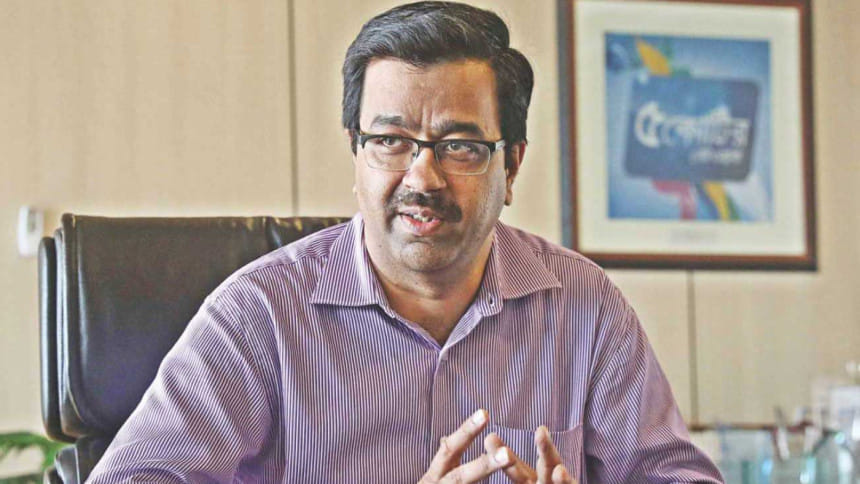Entire country to come under 3G coverage by next year: GP

Grameenphone has received enormous responses from the data service market in its one and a half years into 3G technology, and the operator holds greater plans to further empower subscribers through this service.
Newly appointed Chief Executive Officer of Grameenphone Rajeev Sethi was excited about the prospects of 3G in the country and they have big plans to expand the network within the shortest possible time.
Exuding confidence in their ambition of 'internet for all', Sethi said, "We have big success in voice, and now data is a matter of customer awareness."
In an interview with The Daily Star, Sethi said their plans on network expansion are aggressive -- to cover the entire Bangladesh with 3G network by the end of next year.
Grameenphone currently has 8.7 million subscribers who are using the 3G technology, out of a total of 52 million active SIMs as of March, according to Bangladesh Telecommu-nication Regulatory Commission.
"In a span of 18 months, the response we found from the market was huge, and we consider it an achievement for GP."
Currently 65-70 percent of Grameen-phone's sites cover the 3G network, he said. "As per our parent company's (Telenor Group) plans, we will cover the whole country with modern network by the end of next year."
Subscribers who used internet with their 2G network are mainly the ones who switched to 3G services, Sethi said. "That was a significant achievement for us. Not many countries have seen that kind of a quick change."
With an increasing number of data users, especially of 3G data, Grameenphone's earnings from data are going up every quarter -- it went up from Tk 150 crore in the last quarter of 2014 to Tk 160 crore in the first quarter of 2015.
According to the operator's quarterly business update, their data earnings in the first quarter of 2015 increased 68 percent from the same quarter last year.
Sethi also said they had to invest more in data business to get optimal benefits from it.
In his first interview with the media in his five and a half months in Bangladesh, the CEO said, "Political turmoil in the first couple of months of the year was my main challenge, which impacted us a lot. Our revenue declined and the country's economy was also being affected, and hopefully we are overcoming it."
In the last quarter of 2014, Grameenphone's total revenue was Tk 2,590 crore; it declined 1 percent to Tk 2,520 crore in the January-March quarter of 2015.
On the uncertainties over the upcoming spectrum auction, he said Grameenphone needs additional spectrum to offer better services, but it might shun the auction as some issues are not settled yet.
Until its demands -- resolving the SIM replacement tax issue and allowing technology neutrality -- are met, Grameenphone will not participate in the auction for additional 2G and 3G spectrum, Sethi said.
"The way we are experiencing growth of data and keeping our vision of 'internet for all' in mind, we will need more spectrum in the coming years."
The government has decided to sell the remaining spectrum of 1,800 MHz for 2G services and 2,100 MHz for 3G services. The government could earn $648 million if all the spectrum blocks are sold at the base prices.
When asked whether the industry would face a loss if the auction is called off, Sethi said they need spectrum to offer better services to their customers; so if the auction is called off, it will be a loss for the users as well.
"Increasing the use of internet adds value to the economy, which may suffer."
The BTRC had initially set an auction date for April 30 but rescheduled it twice to May 20 and May 27, as the mobile operators did not apply within the stipulated time.
To ensure the best service quality, they will also need technology neutrality for the efficient use of those spectrums and a long-term roadmap for the industry, he added.
If the government allows the use of any band of spectrum for any technology, then the mobile operators can use their spectrum efficiently, he said.
"We don't know what kind of service we can offer and a roadmap needs to make it clear, which will also be helpful for the investors in making their plans."
On allowing one more mobile phone operator in the market, Sethi said there is already intense competition in the market with six operators, and 80 percent penetration has been achieved.
In response to allegations of a higher number of call drops and poor voice quality, he said, "GP is a company that stands for better service quality for years now. I believe we are well above the industry standards in service quality.
But sometimes the users might think differently."
The operator invested Tk 1,270 crore in 2013, Tk 1,530 crore in 2014, and Tk 370 crore in the first three months this year, to roll out 3G and boost 2G capacity and efficiency, according to its financial report.

 For all latest news, follow The Daily Star's Google News channel.
For all latest news, follow The Daily Star's Google News channel. 



Comments